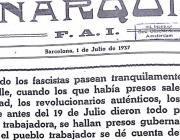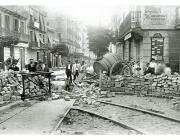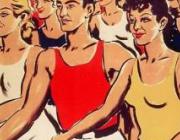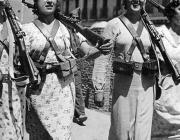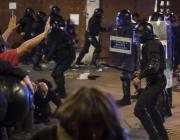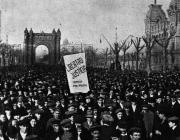Merino Martínez, Julián (1897-1977) - Danny Evans
1913: Barcelona Textile Strike
A strike by women in the cities textile industry against discrimination and working conditions.
The First Congress of the National Confederation of Labor (CNT) (Barcelona, September 8-10, 1911)
The Agenda and texts of the Reports presented to the assembly of delegates representing approximately 27,000 workers at the First (official) Congress of the National Confederation of Labor, held in Barcelona in 1911, providing a glimpse of the doctrinal spectrum represented by the founders of the CNT and the most urgent concerns of the membership of the new organization, including the “rights and duties” of disabled members of the CNT, the creation of rationalist schools, the formation of itinerant propaganda squads, and the need for a daily newspaper.
Sisterly solidarity - Pepita Carpena
The Expropriated Bank of Gràcia: One More Step Forward in the Strategy of Tension – Argelaga
A report from Barcelona (published May 24, 2016) on the eviction of squatters from an expropriated former bank that was being used as a libertarian social center, the role of the City Government led by the former indignado, now Mayor, Ada Colau, in the affair, the resistance mounted by the social center’s supporters, and the political implications of the fact that Colau’s party, Barcelona en Comú (“Barcelona in Common”), despite her reassurances to the contrary, has now become a responsible party to repression and is providing a fig-leaf for a slowly intensifying “strategy of tension” that heralds further authoritarian developments for Spain.
The tragic week, Spain 1909 - Murray Bookchin
Can Vies: the reason of force in Barcelona under police rule - Argelaga
A short article about the recent riots in Barcelona after the city attempted to enforce an eviction order and demolish a popular social center in the neighborhood of Sants known as “Can Vies”, in which the authors observe that, “The total domination of Capital demands a kind of urban space that is managed like a business and pacified like a prison. Within this space there is no room for neighborhood assemblies, or ways of life at the margins of the market economy. In this space, the framework cannot be more authoritarian, and politics is not distinguished from social control. In a world that is heading towards totalitarianism, political management is repression.”
